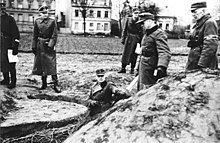|
Hellmuth Reymann
 Hellmuth Reymann (24 November 1892 – 8 December 1988) was an officer in the German Army (Heer) during World War II. He was one of the last commanders of the Berlin Defence Area during the final assault by Soviet forces on Berlin. World War IIFrom 1 October 1942 to 1 October 1943, Reymann commanded the 212th Infantry Division as part of Army Group North. From 1 October 1943 to 1 April 1944, he commanded the 13th Air Force Field Division. Reymann's division suffered heavy losses in the retreat from Leningrad and was disbanded in April 1944. From 1 April 1944 to 18 November 1944, Reymann commanded the 11th Infantry Division. In October 1944, Reymann's division was encircled in the Courland Pocket and he was replaced by General Gerhard Feyerabend.[citation needed] Berlin, 1945In March 1945, Reymann was appointed commander of the Berlin Defence Area and replaced General Bruno Ritter von Hauenschild. When he entered Berlin, Reymann found that he had inherited almost nothing from von Hauenschild. Reymann realised that Adolf Hitler and Joseph Goebbels had ruled that any defeatist talk would lead to immediate execution. No plans were drawn up to evacuate the civilian population, which remained in the city.[1] By 21 April, Goebbels, as Reich Commissioner for Berlin, ordered that "no man capable of bearing arms may leave Berlin". Only Reymann, as commander of the Berlin Defence Area, could issue an exemption. Senior Nazi Party officials, who readily condemned members of the army for retreating, rushed to Reymann's headquarters for the necessary authorisations to leave. Reymann was happy to sign over 2,000 passes to get rid of the "armchair warriors". Reymann's chief-of-staff, Hans Refior, commented, "The rats are leaving the sinking ship".[2] Both Wilhelm Burgdorf and Goebbels convinced Hitler that Reymann should be relieved of command. When Reymann chose not to locate his office next to Goebbels's office in the Zoo Tower, Goebbels held that act against him.[3] On 22 April, Hitler relieved Reymann of his command for his defeatism and replaced him with the newly-promoted Generalleutnant Ernst Kaether, who was the former Chief-of-Staff to the chief political commissar of the German Army (Heer). However, Kaether never took command and his orders were cancelled the next day. The result was that when the first Soviet Army units entered the suburbs of Berlin, there was no German commander to coordinate the city's defences.[3] One day later, Hitler changed his mind again and made Artillery General (General der Artillerie) Helmuth Weidling the new commander of the Berlin Defence Area.[4] Weidling remained in command of Berlin's defenses to the end and ultimately surrendered the city on 2 May to Soviet General Vasily Chuikov.[5] Army Group SpreeAfter his dismissal as the commander of the Berlin Defence Area, Reymann was given a weak infantry division and a brigade sized Panzerkampfgruppe near Potsdam. The force received a dubious designation "Army Group Spree".[3] Reymann's group could not then link up with General Walther Wenck's unit, just south of Potsdam, because of the strong Soviet Red Army forces.[6] On 28/29 April, Wenck's 12th Army held the area around Beelitz long enough for a force of about 20,000 of both Reymann's men and troops from other units to escape through the narrow route to the Elbe.[7] Awards
ReferencesCitations
Bibliography
|
||||||||||||||||||||
